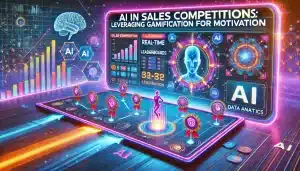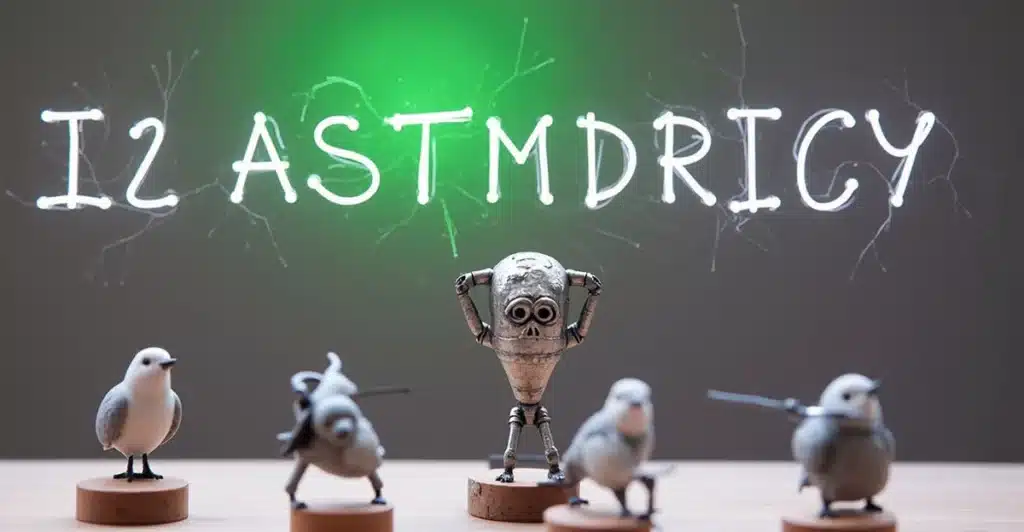In the fast-paced world of sales, keeping teams motivated and engaged is a constant challenge. Traditional incentive structures, while effective to a certain extent, often fail to sustain long-term motivation. This is where the combination of artificial intelligence (AI) and gamification comes into play, offering a fresh, innovative approach to driving sales performance. By leveraging AI in sales competitions, businesses can create a more dynamic and engaging environment that not only motivates sales teams but also enhances productivity and results.
Understanding Gamification in Sales
Gamification involves the application of game-design elements and principles in non-gaming contexts, such as sales, to boost engagement and motivation. In sales, gamification typically includes setting up competitions, awarding points, and offering rewards based on performance. These game-like elements tap into the human desire for competition, achievement, and recognition, making mundane tasks more enjoyable and driving individuals to perform better.
However, traditional gamification approaches can sometimes fall short if they are not personalized or fail to address the specific needs and motivations of individual team members. This is where AI can make a significant difference.
The Role of AI in Gamification
AI enhances gamification by providing data-driven insights and personalized experiences that can significantly improve the effectiveness of sales competitions. Here’s how AI is revolutionizing gamification in sales:
- Personalized Challenges and Goals: AI can analyze individual sales reps’ performance, strengths, and areas for improvement, and then tailor challenges and goals to each person. This personalized approach ensures that the competitions are not only fair but also motivating for all team members, regardless of their experience level.
- Real-Time Performance Tracking: AI-powered platforms can track sales reps’ performance in real-time, providing instant feedback and updates on their progress. This immediate feedback loop keeps participants engaged and motivated to achieve their goals.
- Dynamic Leaderboards: Traditional leaderboards can sometimes be demotivating for those who fall behind. AI can create dynamic leaderboards that adjust based on individual progress, ensuring that everyone has a fair chance to succeed. For example, AI can factor in recent performance improvements, making the competition more inclusive and encouraging continuous effort.
- Smart Rewards Systems: AI can optimize rewards systems by analyzing what types of incentives are most effective for each individual. Some sales reps might be motivated by financial bonuses, while others might prefer public recognition or additional time off. AI can personalize rewards to maximize motivation.
- Behavioral Insights: By analyzing data on how sales reps interact with the gamified system, AI can provide valuable insights into their behavior, preferences, and motivational triggers. This information can be used to further refine the gamification strategy and ensure it remains effective over time.

Benefits of AI-Driven Gamification in Sales Competitions
Integrating AI into sales gamification offers a multitude of benefits that can transform how sales teams operate and achieve their goals. Below are some of the key advantages:
Increased Motivation and Engagement
- Increases Motivation and Engagement: AI-based gamification creates tremendous motivation and engagement among users.
- Personalized competition: Offers a custom, live competition environment that will last the time.
- Long-Term Motivation: It keeps the salespeople motivated throughout the entire sales cycle.
- The participant gets immediate, actionable real-time feedback.
- Tailored Challenges: This approach customizes challenges as per individual strengths and areas requiring improvement.
- Smart Rewards: Intuitive and relevant rewards that keep the experience exciting.
- Averts Common Pitfalls: Boredom and de-motivation are common pitfalls of traditional incentive programs.
Improved Performance and Productivity
- Focus on strength: AI gamification keeps the salesperson on his strengths.
- Improvement Areas Addresses: It finds areas requiring improvement and focuses on them.
- Personalized Goals and Challenges: Develop personal goals to encourage growth and performance enhancement.
- Encourages stretching boundaries: it encourages representatives to go past their comfort zones and progress continually.
- It increases productivity and yield because it forces representatives to attain and meet the targeted levels.
- Continuous Improvement: It fosters a culture of continuous improvement of skills and excellence.
Moreover, the instant feedback provided by AI allows sales reps to adjust their strategies on the fly, optimizing their efforts and maximizing their productivity. This real-time adaptability is crucial in a fast-paced sales environment where conditions can change rapidly.
Better Team Collaboration
- It encourages collaborative teamwork: AI-based game mechanics now transition from individual to team performance.
- Team-Based Challenges: Such challenges will encourage a team’s efforts towards common objectives. This inspires camaraderie. It creates a sense of oneness, and team spirit, especially among huge organizations.
- It identifies complementary strengths by analyzing the strengths of its members for effective pairing or grouping.
- Enhance Team Dynamics: Improve how the team members interact and function together.
- Balanced Competition: The challenges are fair and exciting for all the players.
Enhanced Learning and Development
AI-driven gamification is not just about winning; it’s also a powerful tool for learning and development. By analyzing performance data, AI can identify skill gaps and areas where sales reps need additional training. The platform can then integrate learning modules into the gamification process, turning challenges into opportunities for growth.
For example, if a sales rep consistently struggles with closing deals, the AI can introduce challenges that focus on closing techniques, providing resources and tips along the way. This continuous learning loop ensures that reps are not only competing but also developing their skills, which ultimately benefits the entire organization.
Data-Driven Decision Making
AI’s ability to analyze vast amounts of data in real time is one of its most significant advantages. In the context of sales competitions, this means that managers can make data-driven decisions about how to structure competitions, set goals, and allocate rewards.
For example, AI can analyze historical sales data to predict which types of competition are likely to be most effective for a given team. It can also identify patterns in individual performance, allowing managers to intervene early if a rep is struggling or to offer additional support where needed.
This data-driven approach ensures that sales competitions are not only motivating but also strategically aligned with the organization’s overall sales goals.
Implementing AI-Driven Gamification: Best Practices
To successfully implement AI-driven gamification in sales competitions, it’s essential to follow best practices that ensure the system is effective, engaging, and aligned with business objectives. Here are some key considerations:
Set Clear Objectives
Before implementing any gamification strategy, it’s crucial to define clear objectives. What do you hope to achieve with the sales competition? Are you looking to increase sales volume, improve customer satisfaction, or boost team morale? By setting specific, measurable goals, you can tailor the gamification experience to meet those objectives.
AI can assist in this process by analyzing past performance data to identify areas where improvements are needed and suggesting goals that are both challenging and achievable.
Ensure Fairness and Inclusivity
One of the potential pitfalls of sales competition is that it can sometimes create a sense of unfairness or exclusion, particularly if certain reps consistently outperform others. AI can help mitigate this by personalizing challenges and goals to each individual’s strengths and weaknesses, ensuring that everyone has an equal opportunity to succeed.
Additionally, consider incorporating team-based challenges that encourage collaboration rather than competition. This can help foster a more inclusive environment where everyone feels motivated to contribute.
Provide Continuous Feedback
Continuous feedback is a critical component of any successful gamification strategy. Sales reps need to know how they’re performing relative to their goals and what they can do to improve. AI-driven platforms can provide this feedback in real time, offering insights and suggestions that help reps stay on track.
In addition to performance feedback, consider using AI to provide coaching and training tips. This can turn every competition into a learning opportunity, helping reps develop new skills and strategies that will benefit them in the long term.
Reward Meaningfully
The rewards you offer in a gamification system should be meaningful and aligned with the motivations of your sales team. AI can help you determine which types of rewards are most effective for different individuals, whether it’s financial incentives, public recognition, or additional time off.
Consider offering a mix of rewards to appeal to a broader range of motivations. For example, some reps may be motivated by tangible rewards like bonuses or gifts, while others may value experiences or opportunities for career advancement.
Continuously Evaluate and Optimize
Gamification is not a one-time effort; it requires continuous evaluation and optimization to remain effective. AI can assist in this process by providing ongoing insights into how the gamification strategy is performing and suggesting adjustments based on real-time data.
Regularly review the effectiveness of your sales competition and be willing to make changes as needed. This could involve tweaking the challenges, adjusting the rewards, or even introducing new game mechanics to keep the experience fresh and engaging.
The Future of AI-Driven Gamification in Sales
As AI technology continues to advance, the potential for AI-driven gamification in sales will only grow. We can expect to see even more sophisticated AI algorithms that can predict individual motivational triggers with greater accuracy, create more personalized and dynamic competition environments, and integrate seamlessly with other sales tools and platforms.
In the future, AI-driven gamification could also extend beyond the sales team to include other departments, creating a more unified and motivated organization. For example, customer service teams could participate in gamified challenges that focus on improving customer satisfaction, while marketing teams could engage in competitions to drive lead generation.
Moreover, as remote and hybrid work models become more prevalent, AI-driven gamification will play a crucial role in keeping dispersed teams connected and motivated. Virtual sales competitions, powered by AI, can provide the same level of engagement and excitement as in-person events, ensuring that remote sales reps remain motivated and productive.
Conclusion
AI-driven gamification represents a powerful tool for enhancing sales competition and driving motivation within sales teams. By leveraging AI’s ability to personalize challenges, track performance in real time, and optimize rewards, businesses can create a more engaging and effective sales environment.
The benefits of AI-driven gamification extend beyond motivation and engagement to include improved performance, better team collaboration, and enhanced learning and development. As AI technology continues to evolve, the possibilities for gamification in sales will only expand, offering new opportunities for businesses to inspire and motivate their teams.
FAQs
1. What is AI-driven gamification in sales?
In infusion, gamified sales strategy contains artificial intelligence. Here, artificial intelligence personalizes challenges to give immediate feedback and also rewards optimizing these for improvement in motivation, engagement, and performance.
2. How does AI make sales competitions personalized?
AI analyzes the performance, strengths, and areas for improvement of individual sales reps to create tailored challenges and goals. This will ensure that competitions are fair, engaging, and aligned with individual motivations.
3. Do AI-driven gamifications aid teamwork?
Yes, AI can create team-based challenges with teamwork encouragement and even pose groupings of complementary strengths so there will be camaraderie and balanced competition.



